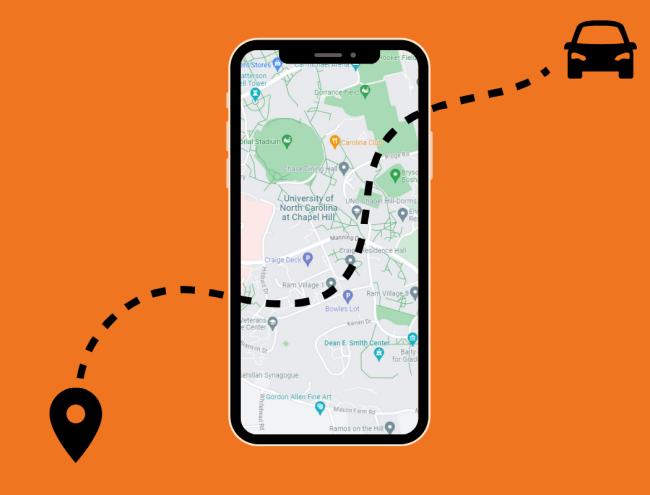You have /5 articles left.
Sign up for a free account or log in.

Students at the University of North Carolina, Chapel Hill can receieve free rides from the UNC Well Ride program to off-campus mental health providers.
Ashley Mowreader | Inside Higher Ed
Following the COVID-19 pandemic, college students continue to show an increased need for mental health services and a desire for in-person connection.
Many college campuses cannot accommodate all students in their own counseling centers due to high demand, instead referring them out to local healthcare providers. However, getting off campus can be a barrier if students lack reliable transportation options.
In 2020, student government leaders at the University of North Carolina, Chapel Hill initiated and piloted a program for students to access free transportation for mental health services off campus. Well Ride, now managed by university staff, allows staff to schedule rideshare transport for students without a car, giving them faster and easier access to their providers.
What’s the need: Around 30 percent of students who engage with UNC’s Counseling and Psychology Services (CAPS) are referred out for open-ended treatment, says Elizabeth McIntyre, referral coordinator and clinical social work.
A majority of college counseling centers focus on short-term therapy, meeting with students for a set number of weeks on a single issue, but some students need additional visits to address larger concerns.
In her role, McIntyre meets with around 18 students per week, providing a targeted list of providers, talking through cost and insurance and helping address frequently asked questions and concerns, such as how to identify a good fit in a therapist.
Off-Campus Availability
Some parts of the U.S. lack sufficient healthcare workers, creating a health workforce shortage area.
North Carolina has 209 mental health professional shortage areas (HPSAs) across the state, but Chapel Hill’s county of Orange only has one facility classified as an HPSA, according to federal data.
While UNC offers telehealth counseling, some students want to have in-person therapy.
“I think there's something more personal and intimate, when you’re being really vulnerable in therapy, to be in the room with a person,” McIntyre says. “I’ve heard from students that if they’ve met with them in-person, then they feel comfortable doing virtual. Like a hybrid model works well, they just want to get that initial connection in-person.”
Of those utilizing off-campus services, many therapists are within a 20-mile radius of campus. Students without a car would have to utilize the public bus system, adding time to the total trip and perhaps requiring students to navigate an unfamiliar route or pay for a rideshare services, increasing total cost of care.
To address the problem, just before the COVID-19 pandemic, UNC students government started Well Ride. CAPS inherited the program this summer, with a majority of the program budget unused and built off the existing program model to service students until the end of the pilot, this December.
How it works: To be eligible for the program, students must live on campus, lack access to a car and be at least 18 years old (a requirement set by Lyft). Students must meet or email with a CAPS staff member to receive approval for the program and demonstrate they have scheduled plans to meet with a therapist.
Staff members schedule the rides to and from the student appointment using Lyft’s business portal, sending push notifications to the student to call the ride from one of three locations on campus. Student leaders prioritized student safety and elected to not have students picked up from their dorm rooms, but instead at a general public space, McIntyre explains.
Rides aren’t scheduled for a specific time, just for a particular day so students can select what pickup and return trip works best for their schedule without the help of staff members.
There’s no cap on the number of rides a student can take with Well Ride because the office has an abundance of unused funding, McIntyre says. The program is funded by a $25,000 grant from the UNC Parents Council, according to UNC’s website.
Next steps: Around 25 students have used the program so far this semester, and the pilot aimed to support between 50 to 80 students, McIntyre says. Students requested 40 rides between January and March 2020, according to The Daily Tar Heel.
The program is especially helpful for first-year or new students at UNC who may have trouble navigating campus as is, McIntyre says. Well Ride alleviates the burden of learning to navigate Chapel Hill while hoping to address mental health concerns.
If CAPS receives additional funding to continue the program, staff are looking to modify the process to allocate a Lyft pass to students, giving them an allotted number of rides or dollars covered by the university rather than a ride-by-ride approval process, McIntyre says. CAPS staff may also create a student survey to understand the impact of the program, but right now is focused on expanding reach among eligible students.
Seeking stories from campus leaders, faculty members and staff for our Student Success focus. Share here.




